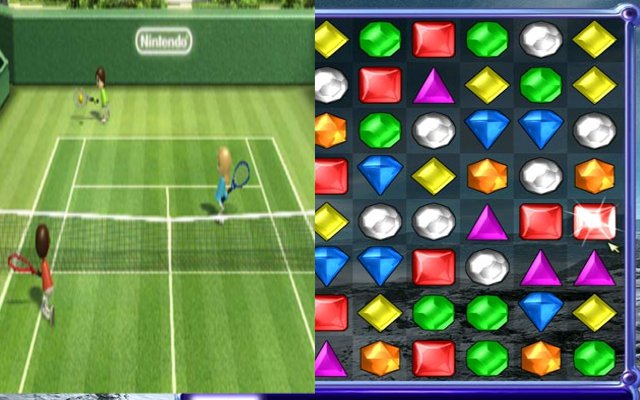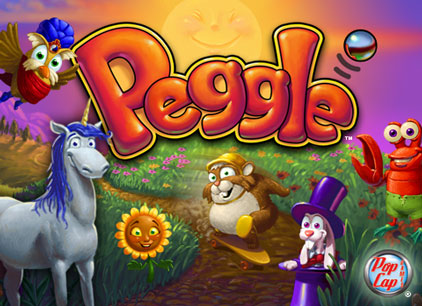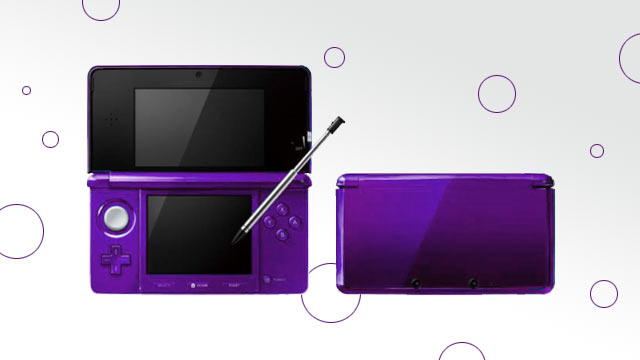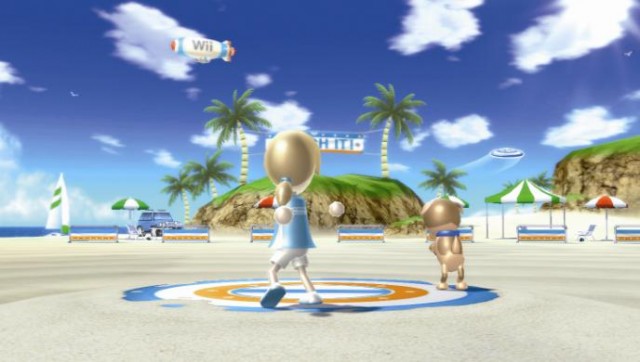
|
PopCap and Nintendo share certain qualities. They are both well-known companies acclaimed for their work on their respective projects. They both own huge intellectual properties and continue to support them today. Oh, and I love both of them. Let’s face it though, these similarities are quite general, and honestly, I think it would be quite irrational to claim that PopCap is a larger and more successful company than Nintendo. Meanwhile, Nintendo isn’t perfect, and PopCap’s success in the casual game market could rub off on Nintendo in some positive ways. PopCap does the following, but Nintendon’t.
Come up with new ideas
 PopCap’s success began in 2000 with Bejeweled. Bejeweled, like some original Nintendo games (Super Mario Bros, The Legend of Zelda, Donkey Kong) is arguably one of the greatest achievements of its generation, and an exemplar of flawless game design. And Bejeweled, like every original Nintendo game, has been ported or featured on nearly any device with a screen in some way, shape, or form in the last ten years. PopCap has developed and/or published an astonishing 41 games in its ten year existence, with less than ten of said games being sequels. While I can’t promise you all those games are of quality, that’s an impressive number for a company that started in flash game development. This number is, of course, in stark contrast to the number of Nintendo-developed and/or -published games, but (with the exception of a lot of DSiWare games) a sizeable percentage of these games are sequels.
PopCap’s success began in 2000 with Bejeweled. Bejeweled, like some original Nintendo games (Super Mario Bros, The Legend of Zelda, Donkey Kong) is arguably one of the greatest achievements of its generation, and an exemplar of flawless game design. And Bejeweled, like every original Nintendo game, has been ported or featured on nearly any device with a screen in some way, shape, or form in the last ten years. PopCap has developed and/or published an astonishing 41 games in its ten year existence, with less than ten of said games being sequels. While I can’t promise you all those games are of quality, that’s an impressive number for a company that started in flash game development. This number is, of course, in stark contrast to the number of Nintendo-developed and/or -published games, but (with the exception of a lot of DSiWare games) a sizeable percentage of these games are sequels.
PopCap was able to follow up Bejeweled with smash hits such as Zuma, Feeding Frenzy, Peggle, and Plants vs. Zombies. Of course, when it comes to the amount of original IPs Nintendo has published/developed, they come out once again bearing the larger number. Is it really fair for me to compare a ten year tenure to a 40+ year one, or vice versa? I believe so. The four aforementioned PopCap games, in my opinion, have had more of a profound positive impact in the video game industry more than any original Nintendo IP has in the past decade. Yes, this includes Wii Sports. Bejeweled and Peggle are the undisputed sons of Tetris, and Plants vs. Zombies is the essential “show-everyone-how-it’s-done” game for the bubbling tower defense genre. Nintendo needs more games, rather than technology, that serve as a template for every game developer for 5-10 years.

One of my lingering concerns with Nintendo’s upcoming 3DS (though I absolutely want one and will probably buy one on launch day, do not get me wrong) is the launch lineup, filled with games from nearly every popular Nintendo franchise, along with well established games from other consoles such as Splinter Cell: Chaos Theory and Metal Gear Solid 3: Snake Eater. From a business standpoint, it makes perfect sense for Nintendo to open the next chapter in its handheld reign with familiarity, but what is it going to do for the next five years? It seems as if it is largely depending on third parties to support 3DS (which is not a negative at all, in fact, I’m excited to see Nintendo actually recognizing them), but as I said, Nintendo itself needs to do something different, and that something isn’t Super Mario (Universe?), Legend of Zelda: (important quest item), or Pokemon (color or stone). We’ve heard it for the last ten years, but will Nintendo take a risk? The realist in me says no, but I want to believe.
Make casual games that are actually good
The original Wii Sports is not a good game. At all. Too many times were we hyped by trailers for and live television demonstrations of the game by Nintendo, only to be disappointed by the final product (I was, at least). The tennis game can literally be played (and most importantly, won) while looking away from the television screen. The bowling game can be manipulated by even the most senile man/woman at the retirement home to score multiple strikes, or even turkeys. The golf game is all over the place. The original Wii remote is basically an IR pointer + accelerometer, and while I give credit to Nintendo for being the first to utilize this in popular video gaming, it’s not accurate by any means and definitely not ideal for a golf game. The same can be said for the baseball game: it’s all timing and no direction or power. The boxing game, last and also least, is completely broken. I do not understand how anyone could deem Wii Sports a “groundbreaking,” let alone “good” game. In fact, I’d argue that Play – ostensibly a cereal-box prize for buying an extra Wii remote – is a better collection than Sports. All in all, I believe that the “Wii X” IP, while extremely successful, falls short most of the time when it comes to having fun.
Meanwhile, PopCap has managed to magnetize the most sporadic of gamers with Peggle, Zuma, Bejeweled, and even the tongue-in-cheek Plants vs. Zombies. They’ve done so without simplifying core gameplay to an elementary level. It’s not that there’s anything overly complex about the aforementioned titles, either, but then again, neither is maintaining rhythm and pressing more than two buttons. Contrary to popular belief, kids are not stupid, and there is a seemingly infinite quantity of Youtube videos I could show you to prove my point. It’s a misconception seen and heard everywhere, and Nintendo is certainly not the only guilty party. Nevertheless, there should be some re-thinking done regarding this erroneous belief. Come on, we were five years old when we beat Metroid or Super Mario World or Super Mario 64, and without strategy guides, too! What makes Nintendo think today’s 1st and 2nd graders would be completely incompetent in attempting to play Sin and Punishment? What makes Nintendo think an old person couldn’t try their hand at it? This is how Nintendo looks at young children and the elderly. Why else would Wii Music even exist?
This March, The Today Show aired a piece on the self-proclaimed “Big Fish Babes,” a group of 60-something year old women across America who met while playing Big Fish Games’ casual titles online. The piece itself, while very cheesy and out of touch with the last ten or twenty years of events in video game history, should really alleviate inane generalizations of video game culture in popular media. Instead, nearly every non-video-game news source regurgitated the piece as “Computer Games Not for Kids Anymore,” “Big Fish Babes Take Over Video Games,” or “Move Over, Pasty White Nerds.”
“When you hear ‘video games’, you think of 13 year old boys,” Maria Menounos confidently states, to which the 60-something being interviewed agrees.
While Nintendo is at the forefront of the casual gaming movement (that it is the largest video game company in the world being a prime factor), it is also effectively keeping this ludicrous stigma alive. The Wii line is mass-marketed to general audiences, but the approach, presentation, and gameplay of these titles are juvenile-at-best. PopCap can make a game for 5 year olds without it looking like a game made for five year olds. As of right now, Nintendo cannot.
In conclusion…
Nintendo is not in any danger at all. It’s doing just fine. Perhaps it’s doing “too” fine, though– its M.O. these past few years has gone stale, and that’s hard to ignore. Hardware sales are going down, and so are software sales. Wii has the lowest attach rate of all three major competing consoles as of the time of this writing. Granted, many Wii buyers can be described as the stereotypical old folk or the busybody soccer mom with six kids who will play Wii Sports (and maybe Wii Play) and never touch the system again, but is that not a problem for Nintendo? Does that not make Wii an expensive novelty toy for some people?
Wii is a great console, and while Nintendo does a great job at single-handedly supporting it, that’s not helping its name. This is why we still see ill-researched garbage about video games on television. This hubbub over casual gaming in the past half-decade has outshined a glaring, but not completely obvious fact– Nintendo did in fact take a risk with Wii and DS. Many loyal, hardcore Nintendo fanboys felt betrayed by the Big N’s sudden pandering to a different demographic. What the company needs to do is take another risk, but this time, an ever bigger one: blur the line between casual and hardcore gaming so we never have to hear of such tired stereotypes ever again. PopCap has done its part, Nintendo, but it needs your help, now. Maybe it can teach you a thing or two along the way.





 ShareThis
ShareThis







